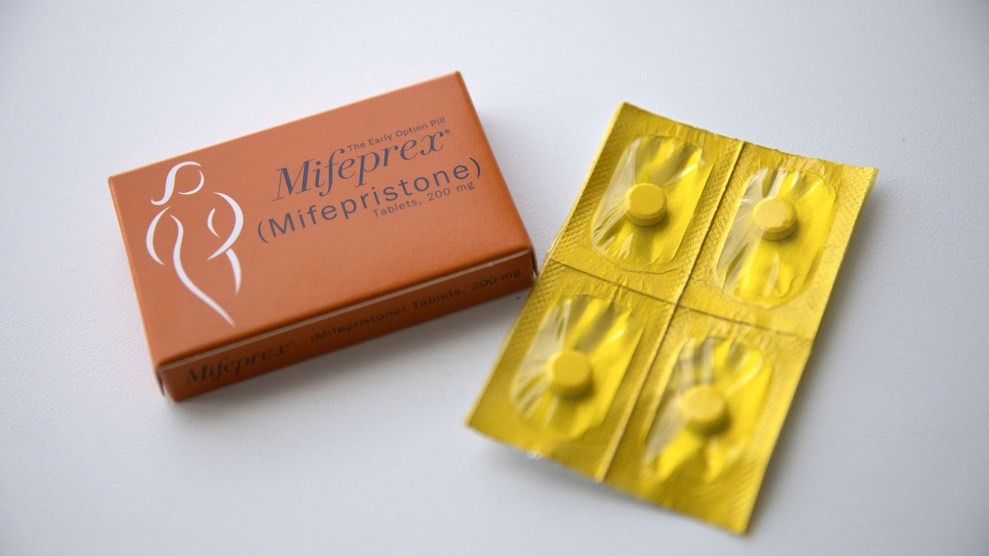
timnewman/Getty
Two months before a right-wing judge in Texas threw the legal status of the abortion pill mifepristone into limbo, a group of red-state attorneys general ganged up on executives at CVS and Walgreens, trying to stop them from filling prescriptions for the abortion medication through the mail. In a letter citing a federal law that hadn’t been enforced for half a century, the lawyers warned the chains of future criminal prosecution—never mind that mifeprisone has been FDA-approved for decades and used to end the pregnancies of over 5.6 million US women.
The law at issue—the Comstock Act, named after 1800s anti-sex crusader Anthony Comstock—is an Orwellian, puritanical, Victorian-era statute that criminalizes the mailing of “every obscene, lewd, lascivious, indecent, filthy or vile article, matter, thing, device, or substance.” Comstock himself, a former Civil War solider who moved to New York only to be scandalized by its thriving vice district, was fixated on eradicating pornography, which he considered to be anything remotely related to sex, according to the historian Lauren MacIvor Thompson. As an activist enforcer of New York anti-vice laws, he collected and destroyed mountains of books, art, contraception, sex education manuals, and women’s rights literature—and some of it, he brought to Washington, DC, on a lobbying trip. “He goes down to Congress with literally a truckload of ‘obscene’ material,” Thompson recounts. “In some random room in the Capitol building, he displays all the porn and the sex toys and whatever else he’s collected, so that he’ll shock congressmen. Of course, they are shocked.”
The Comstock Act includes in its list of “unmailable” items “every article or thing designed, adapted, or intended for producing abortion.” Violating the act is punishable by up to five years in federal prison. In the past, the act was enforced by an army of postal inspectors who regularly peeked into people’s mail, screening letters and packages en masse for mentions of sex and contraception, Thompson says. Today, though the statute is still on the books, a century of court decisions about privacy, freedom, and the First Amendment have rendered it dormant.
But once Roe v. Wade was overturned—ostensibly putting the legality of abortion in the hands of the states—the anti-abortion movement seized on the Comstock Act as a means to accomplish its longtime goal of banning abortions nationwide. Last summer, former Texas solicitor general Jonathan Mitchell, the architect of the state’s bounty hunter anti-abortion law, started pushing New Mexico towns to adopt local ordinances that bizarrely incorporated the Comstock Act into business licensing laws. (According to New Mexico ACLU attorney Ellie Rushforth, the ordinances were designed to provoke a legal challenge that could send the question of whether the Comstock Act still applies to the Supreme Court.) In November, Alliance Defending Freedom, the conservative Christian legal group, filed a lawsuit in Amarillo, Texas, challenging mifepristone’s FDA approval, and pointing to the Comstock Act in its arguments for why the drug’s distribution should be immediately halted. A month later, the Biden administration laid out its stance that the law only criminalizes people who mail things they know will be used for an illegal abortion—a difficult-to-prove charge, given that exceptions to save the life of a pregnant person exist in every state.
In their letter to the pharmacies, however, the conservative AGs warned the corporate executives not to sleep on the Comstock Act. “We reject the Biden administration’s bizarre interpretation, and we expect courts will as well,” they wrote.
In the past seven days, some of those judges have shown themselves. In a bombshell ruling on the ADF suit, Trump-appointed judge Matthew Kacsmaryk temporarily ended the FDA’s approval of mifepristone. In his order, which is currently on hold, Kacsmaryk wrote approvingly of the conservative activist argument that mailing the drug violates the Comstock Act. “It is indisputable that chemical abortion drugs are both ‘drug[s]’ and are ‘for producing abortion,’” Kacsmaryk wrote. “Therefore, federal criminal law declares they are ‘nonmailable.”
“I think this is the opening shot across the bow of the anti-abortion movement, weaponizing Comstock in further arguments and litigation,” Rachel Rebouche, dean of Temple University School of Law, said of Kacsmaryk’s decision.
On Wednesday, even as the conservative US Court of Appeals for the Fifth Circuit blocked parts of Kacsmaryk’s order from taking effect, a panel of judges nonetheless wrote that the “plain text” of the Comstock Act forbids mailing a “prohibited abortion item.” Currently, the Supreme Court has issued a stay while it mulls what to do in the short term about mifepristone’s FDA approval. Legal scholars interviewed by Mother Jones say the justices aren’t likely to rule on the questions around the Comstock Act in any forthcoming decisions on the case.
But the anti-abortion right doesn’t need a Supreme Court ruling to start carrying out the law. All it would take is a new White House administration, with new Justice Department officials willing to file Comstock Act charges. “A future U.S. Attorney General will almost certainly reject the Biden administration’s results-oriented, strained reading [of the Comstock Act],” the conservative attorneys general threatened CVS and Walgreens.
Mary Ziegler, a reproductive law expert and historian, says Comstock Act prosecutions are “definitely on the table” under a more conservative administration. “In 2024, we’re going to have a new election,” says Joanna Grossman, a law professor at Southern Methodist University. “You would only need a week to go get a new Department of Justice head, and get a federal criminal prosecution.”
What’s more, experts expect that such an administration could use the law to target more than just mifepristone. Under a literal reading of the law, federal prosecutors could file criminal charges against almost any individuals or companies that ship medications or equipment to be used for abortion. “If Comstock really applies, it wouldn’t just apply to pills,” Rebouche explains. “It would prohibit people from mailing forceps or suction devices or surgical gloves that are used in any kind of abortion. That’s the breadth of the Comstock Act.”
A decision to interpret the Comstock Act broadly—either by the Supreme Court, or, in lieu of that, by the White House—would amount to a national ban on abortion, Ziegler says. It would certainly end the legal distribution of mifepristone, which accounts for more than half of all US abortions, according to the most recent data. Abby Long, director of marketing and public affairs for Danco Laboratories, the manufacturer of brand name mifepristone, worries the law could be used not only to stop providers from mailing the drug to patients, but also to freeze its upstream supply chain, banning shipments of mifepristone from manufacturers to distributors, and from distributors to doctors and pharmacies. “The Comstock Act, if applied, could reach beyond dispensing through the mail as the drug is moved in interstate commerce between manufacturers, distributors, and customers,” Long wrote in response to questions from Mother Jones.
Danco, of course, opposes the resurrection of the Comstock Act: “This is a basically defunct Act which we do not believe should be applicable in normal commercial activity, whether regarding mifepristone or any other pharmaceutical drug,” Long wrote. Yet simply the threat of prosecution by the red-state AGs appears to have spooked other corporate officials. Walgreens announced in March that it wouldn’t distribute mifepristone in the states whose top attorneys signed the February letter.
So would a future Republican president choose to enforce the law more broadly? Who’s to say. After all, GOP politicians are currently tripping over themselves to say nothing of substance about abortion, following their series of embarrassing, abortion-rights related electoral defeats.








